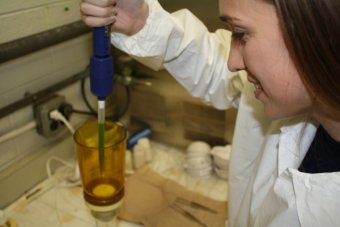Environmental engineering student Hannah Drake extracts algae as part of an experimental process for the EPA competition.
The painstaking research process being undertaken by a group of Old Dominion University engineering students will be worth it when they show their results this spring on the National Mall in Washington, D.C., as part of a competition sponsored by the Environmental Protection Agency (EPA).
But for now, the team of nine undergraduate and graduate engineering students is under the gun. "It really is a race against time," said Jose Garcia, a doctoral environmental engineering student in the Frank Batten College of Engineering and Technology.
Last year, Garcia's team won a spot in the EPA's P3 (People, Prosperity and the Planet) competition, and they will demonstrate their project at the National Sustainable Design Expo 2014, April 25-27. They'll join 40 other teams of scientists and engineers from colleges and universities across the United States.
The ODU students, who are advised by Sandeep Kumar, assistant professor of civil and environmental engineering, will bring a revolutionary algae processing technique to the competition, one where key nutrients are removed from the algae using a proprietary process designed by Kumar before the algae are turned into fuel.
But the students are under the gun because the better the process performs at the Expo, the better chance the team has to win one of a handful of coveted $90,000 EPA grants.
"Our goal is to try to scale up and commercialize this process," said Garcia, who is from Bolivia. "Here in Virginia and around the world, there has been a tremendous push to make alternative fuels economical, because fossil fuels are increasingly more expensive, biofuels greenhouse emissions are lower and the materials used are renewable."
Biofuels themselves are not a new concept. The ODU team's breakthrough is in the algae processing technique, which pulls nutrients such as nitrogen and phosphorus out of the organisms before they are turned into fuel, resulting in a more efficient burn of the fuel, and the creation of a useable byproduct for things such as fertilizer, food and feed supplements.
Working in a lab in ODU's Kaufman Hall, the team is able to extract and recover more than 70 percent of the nitrogen and 90 percent of the phosphorus from the algae in just a few seconds of reaction time - using a flash hydrolysis process Kumar developed - while preserving oils and sugars in the solid product, which is a better feedstock for biofuels production.
"This is a great opportunity to showcase our last two years of work through this competition," Kumar said.
The ODU engineering team is racing against time to determine the best way to use the extracted nutrients from the algae biomass. In a lab across the hall from the reactor, algae with different "recipes" are being grown in two-liter bottles - using different combinations of nutrients (nitrogen and phosphorus) from fertilizers and those recovered after flash hydrolysis.
Hannah Drake, an environmental engineering master's student from Virginia Beach, said the goal is to extract as much byproduct as possible following the flash hydrolysis process.
"We're trying to figure out the nutrient balance that's optimal for this experiment," Drake said.
To do that, the team needs to cultivate, grow, drain and freeze-dry the algae, a time-consuming process. Adding to the time pressure, Garcia said, is the 15-page technical report that the team must provide to the EPA contest directors by March, which will spell out the exact process the team will use, with confirmed results from experimental data.
Other team members include engineering students Sergiy Popov, Caleb Talbot, Jonathan Ricci, Paul Wilson, Ali Teymouri, Kwamena Mfrase-Ewur and Victor Collins.
The race is on worldwide to find sustainable alternatives to fossil fuels to meet the globe's soaring demand for transportation fuel. A recent report from the National Research Council determined that converting 5 percent of the U.S transportation fuels (more than 10 billion gallons per year) using algae would place unsustainable demands on energy, water and nutrients if produced with current technologies.
Kumar said the use of wastewater to cultivate algae for fuels - and more importantly, recovering and recycling nutrients such as nitrogen and phosphorus in the process developed at ODU - means that this technology could result in more efficient biofuels production. Further, it is a process that won't compete for these vital nutrients with traditional crops.
The National Sustainable Design Expo brings together students, nonprofit organizations, government agencies and businesses that are working to create a sustainable future.
The Expo offers a unique opportunity to discover innovative, cutting-edge technologies developed by university students and their faculty advisers, learn what nonprofit organizations and government agencies are doing to achieve sustainability, experience sustainable products that are currently available and recruit talented hires with backgrounds in the broad range of disciplines found in the sustainability arena.
For information about the competition, see: http://www.epa.gov/P3/.




